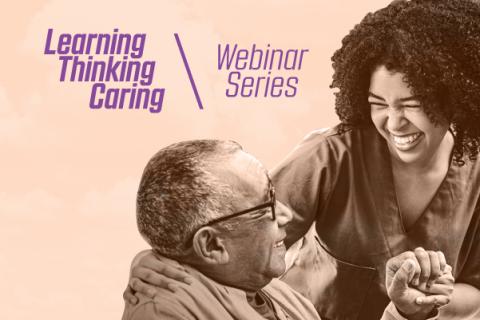Learn. Think. Care.
Build personal resiliency, knowledge, and strategies for meeting the needs of clients.
Professional caregivers in long-term care environments face unique challenges which may impact their personal health and wellbeing. A workshop series, Learn. Think. Care., offered by University of Illinois Extension, helps build resiliency in key areas impacting their health.
Professionals who work with older adults often have trouble accessing convenient continuing education opportunities. This series is designed for professionals to join the session online, during their work day, eliminating the barriers of time and travel that often impair participation in continuing education.
Three free one-hour workshops will be held online, each beginning at 2 p.m. Register at go.illinois.edu/LTCwebinars at least one week prior to each workshop to receive all access information. CEUs and CPDUs are available for a fee.
Workshop topics:
Let's Talk About Stress | Sept. 8 @ 2 PM
- Stress is a funny thing. It can be something helpful that gets us motivated to get our work done. But, if people don’t find an outlet for it and allow stress to build, they can experience negative effects mentally and physically. Discover the importance of self-care and explore a variety of practical techniques to use to manage stress and improve health and well-being.
Happy Hacks for More Positivity and Increased Well-Being | Oct. 6 @ 2 PM
- People are bombarded with negativity, stress, and countless threats to their emotional well-being, work, and close relationships. New research in neuroscience and positive psychology shows that when people experience happiness and positivity, it turns on all the learning centers in the brain and fuels positive outcomes in all aspects of their lives. Learn the common barriers to positivity and personal well-being and find out more about simple science-backed principles and practices or “happy hacks” to boost positivity, productivity, mood, and attitude.
The Trauma Informed Care Professional | Nov. 3 @ 2 PM
- Becoming “trauma-informed” means recognizing that people often have many different types of trauma in their lives. People who have been traumatized need support and understanding from those around them, including long-term care professionals. Often, trauma survivors can be retraumatized by well-meaning caregivers and community service providers. Understanding the influence of trauma is an essential first step in becoming a compassionate and supportive professional. Gain a shared understanding and language of trauma, awareness of the prevalence of trauma, and a shift in thinking to become more trauma-informed and aware.
If a reasonable accommodation is needed to participate, contact Karla Belzer at kbelzer@illinois.edu. Early requests are strongly encouraged to allow sufficient time to meet access needs.
